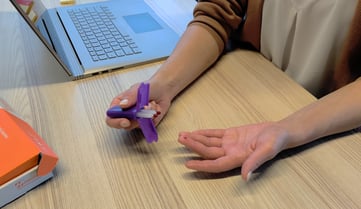Share this
things to consider when pivoting to remote research studies
by Neoteryx Microsampling on Apr 12, 2021 12:00:00 PM
As the world navigated the challenges posed by the SARS-CoV-2 virus, a paradigm shift in clinical research emerged. The SARS-CoV-2 episode underscores the vital role of virtual or remote research studies. Drawing insights from this era, this guide offers foundational steps to initiate remote clinical research across various fields.

The Rationale for Virtual Clinical Studies
-
Safety & Convenience: Reflecting on the SARS-CoV-2 crisis, the traditional model of onsite clinical studies was evidently risky. Remote research not only ensures the safety of participants but also provides unparalleled convenience.
-
Cost-Effectiveness & Efficiency: Beyond the safety advantages, remote specimen collection inherently presents a cost-efficient model, and positions a clinical study for improved recruitment and retention.
Foundational Steps for Launching Virtual Studies
1. Initiate Digital Onboarding:
- A secure, compliant, and user-friendly onboarding system is the bedrock.
- Participants should be able to schedule calls or virtual meetings with research teams with ease.
2. Establish a Dedicated Webpage for the Study:
- Maintain public trust with a transparent, informative webpage.
- Essential inclusions: Study objectives, participation requirements, registration processes, and staff contact information.
3. Implement a Secure Online Portal:
- Participants require a centralized hub for all study-related interactions.
- The portal should house vital documents, FAQs, and even personalized data, safeguarded with top-tier security.
4. Offer Flexible Remote Data Submission Channels:
- Diversify submission mediums - from phone interviews to digital questionnaires.
- Consider platforms such as Medidata, ICON, and Halo Health Systems. for seamless data collection.
5. Integrate Reliable Remote Data Collection Tools:
- Drawing from the SARS-CoV-2 experience, wearable device became indispensable for real-time health monitoring.
- Remote sampling tools like the Mitra® device enabled participants to contribute samples without any professional intervention.
- Establish standard procedures for mailing and analyzing these samples.
6. Provide Robust Training & Support Materials:
- Offer easily accessible online training resources.
- Leverage multimedia - from written guides to instructional videos.
- Address the diverse learning needs of participants to ensure quality data collection.
Remote Research Studies Help Overcome Challenges
/2022%20Mitra%20Lifestyle%20Images%20(approved)/mailing-no-cold-chain.jpeg?width=360&height=210&name=mailing-no-cold-chain.jpeg) Remote technologies offer pharmaceutical companies and research organizations a new way to conduct research studies with more convenience and efficiency. Remote or "mail-in" approaches are particularly helpful during times when people are reluctant to travel to hospitals or other medical facilities.
Remote technologies offer pharmaceutical companies and research organizations a new way to conduct research studies with more convenience and efficiency. Remote or "mail-in" approaches are particularly helpful during times when people are reluctant to travel to hospitals or other medical facilities.
 Many scientists learned the value of remote research studies and portable technologies during the COVID-19 Pandemic. They used Mitra devices paired with telehealth communications to continue their studies without interruption, even during lockdowns, social distancing, and other restrictions.
Many scientists learned the value of remote research studies and portable technologies during the COVID-19 Pandemic. They used Mitra devices paired with telehealth communications to continue their studies without interruption, even during lockdowns, social distancing, and other restrictions.
From Retrospection to Forward-Thinking
The SARS-CoV-2 pandemic was a touchstone moment for clinical research, revealing the potential of remote methodologies. As we look forward, the insights from this era can shape future clinical trials, making them more adaptive, efficient, and participant-centric.

Image Credits: Shutterstock, Trajan, Neoteryx
Share this
- Microsampling (206)
- Research, Remote Research (119)
- Venipuncture Alternative (105)
- Clinical Trials, Clinical Research (83)
- Mitra® Device (73)
- Therapeutic Drug Monitoring, TDM (51)
- Dried Blood Spot, DBS (39)
- Biomonitoring, Health, Wellness (30)
- Infectious Disease, Vaccines, COVID-19 (24)
- Blood Microsampling, Serology (23)
- Omics, Multi-Omics (21)
- Decentralized Clinical Trial (DCT) (20)
- Specimen Collection (18)
- Toxicology, Doping, Drug/Alcohol Monitoring, PEth (17)
- Skin Microsampling, Microbiopsy (14)
- hemaPEN® Device (13)
- Preclinical Research, Animal Studies (12)
- Pharmaceuticals, Drug Development (9)
- Harpera Device (7)
- Industry News, Microsampling News (5)
- Antibodies, MAbs (3)
- Company Press Release, Product Press Release (3)
- Environmental Toxins, Exposures (1)
- July 2025 (1)
- May 2025 (1)
- April 2025 (2)
- December 2024 (2)
- November 2024 (1)
- October 2024 (3)
- September 2024 (1)
- June 2024 (1)
- May 2024 (1)
- April 2024 (4)
- March 2024 (1)
- February 2024 (2)
- January 2024 (4)
- December 2023 (3)
- November 2023 (3)
- October 2023 (3)
- September 2023 (3)
- July 2023 (3)
- June 2023 (2)
- April 2023 (2)
- March 2023 (2)
- February 2023 (2)
- January 2023 (3)
- December 2022 (2)
- November 2022 (3)
- October 2022 (4)
- September 2022 (3)
- August 2022 (5)
- July 2022 (2)
- June 2022 (2)
- May 2022 (4)
- April 2022 (3)
- March 2022 (3)
- February 2022 (4)
- January 2022 (5)
- December 2021 (3)
- November 2021 (5)
- October 2021 (3)
- September 2021 (3)
- August 2021 (4)
- July 2021 (4)
- June 2021 (4)
- May 2021 (4)
- April 2021 (3)
- March 2021 (5)
- February 2021 (4)
- January 2021 (4)
- December 2020 (3)
- November 2020 (5)
- October 2020 (4)
- September 2020 (3)
- August 2020 (3)
- July 2020 (6)
- June 2020 (4)
- May 2020 (4)
- April 2020 (3)
- March 2020 (6)
- February 2020 (3)
- January 2020 (4)
- December 2019 (5)
- November 2019 (4)
- October 2019 (2)
- September 2019 (4)
- August 2019 (4)
- July 2019 (3)
- June 2019 (7)
- May 2019 (6)
- April 2019 (5)
- March 2019 (6)
- February 2019 (5)
- January 2019 (8)
- December 2018 (3)
- November 2018 (4)
- October 2018 (7)
- September 2018 (6)
- August 2018 (5)
- July 2018 (8)
- June 2018 (6)
- May 2018 (5)
- April 2018 (6)
- March 2018 (4)
- February 2018 (6)
- January 2018 (4)
- December 2017 (2)
- November 2017 (3)
- October 2017 (2)
- September 2017 (4)
- August 2017 (2)
- July 2017 (4)
- June 2017 (5)
- May 2017 (6)
- April 2017 (6)
- March 2017 (5)
- February 2017 (4)
- January 2017 (1)
- July 2016 (3)
- May 2016 (1)
- April 2016 (2)


No Comments Yet
Let us know what you think